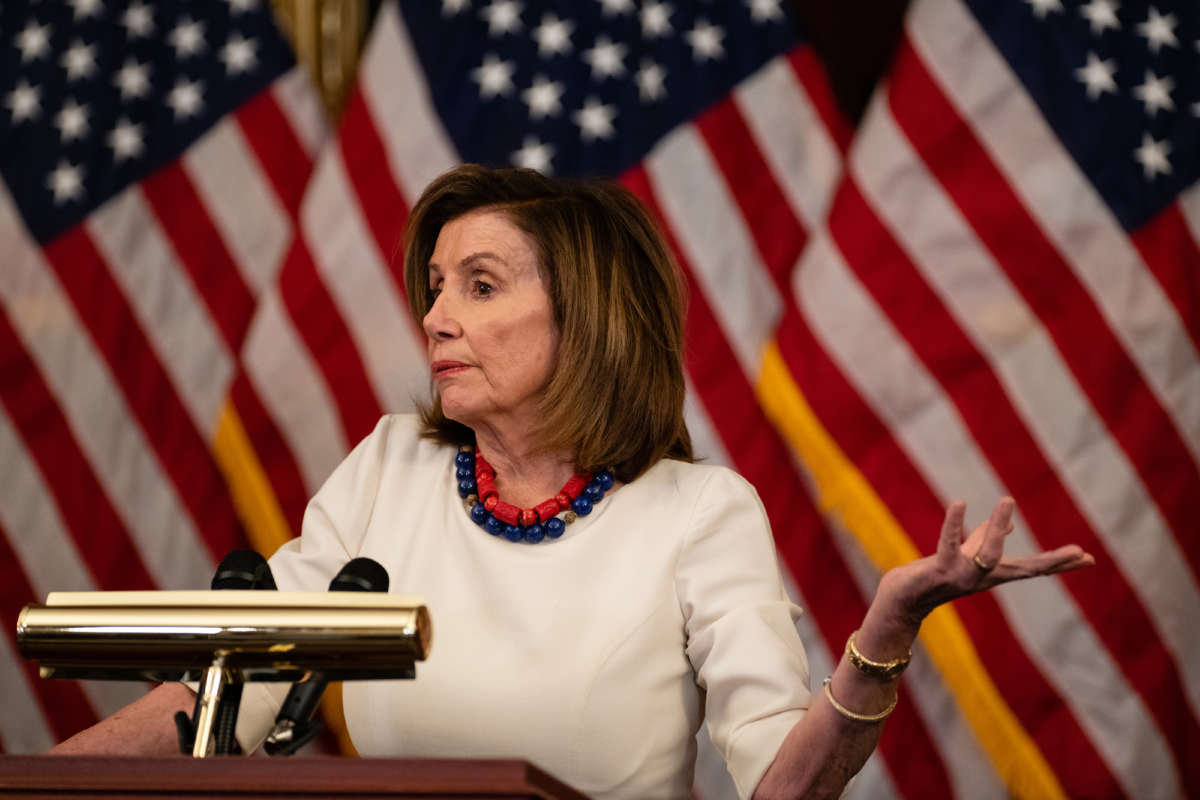As Democrats discuss implementing a ban on stock trading for members of Congress, House Speaker Nancy Pelosi (D-California) signaled on Thursday that she may be open to passing such a ban, despite her opposition to the proposal.
Pelosi reiterated her opposition at a press conference on Thursday, but said that she would support the Democratic caucus if they wanted to pass such legislation. “I just don’t buy into it, but if members want to do that I’m OK with that,” she said.
Pelosi added that she has asked the House Administration Committee to review the STOCK Act. Although the bill aims to increase transparency around lawmakers’ stock trades, it has such lax penalties that members regularly violate the law and face little consequences.
Pelosi has come under scrutiny over the past weeks for her defense of Congress members’ ability to trade stocks despite a huge scandal in 2020, when members were accused of insider trading. The accusations came after members made major stock trades directly after receiving confidential information about the pandemic’s imminent effect on the stock market.
“We’re a free market economy. [Members of Congress] should be able to participate in that,” Pelosi said in December. The speaker is among the richest of Congress’s over 500 members, and her husband, Paul Pelosi, is a very active stock trader. In fact, Paul Pelosi is such a prominent trader that people have begun following his trades as a stock trading strategy.
Pelosi faced pushback for her comment. “There is no reason members of Congress should hold and trade individual stock when we write major policy and have access to sensitive information,” Rep. Alexandria Ocasio-Cortez (D-New York) tweeted at the time. “There are many ways members can invest w/o creating actual or appeared conflict of interest, like thrift savings plans or index funds.”
Last week, Senators Jon Ossoff (D-Georgia) and Mark Kelly (D-Arizona) introduced a bill that would bar members of Congress and their families from participating in stock trading while in office. The bill would compel members to move their portfolios into a blind trust shortly after being sworn in. The proposal appears to have bipartisan support, as Republicans in Congress have signaled their support for the idea.
The public is also in favor of the ban. Just over the past few weeks, several polls by different polling groups have confirmed that a majority of Americans support banning stock trading for members of Congress. Data for Progress, for instance, found that 74 percent of voters support the proposal when they are presented with arguments for and against a ban, including a majority of respondents from across the political spectrum.
Last year, Sen. Elizabeth Warren (D-Massachusetts) proposed a similar bill that would not only disallow members of Congress from trading stocks, but also prominent federal officials like judges and presidents.
Lawmakers, including Ocasio-Cortez, introduced a bill last year that would prohibit Congress members and senior staff from trading individual stocks. The bill, which had bipartisan support, also sought to root out corruption by barring members from serving on boards of corporations.
Join us in defending the truth before it’s too late
The future of independent journalism is uncertain, and the consequences of losing it are too grave to ignore. To ensure Truthout remains safe, strong, and free, we need to raise $44,000 in the next 6 days. Every dollar raised goes directly toward the costs of producing news you can trust.
Please give what you can — because by supporting us with a tax-deductible donation, you’re not just preserving a source of news, you’re helping to safeguard what’s left of our democracy.
